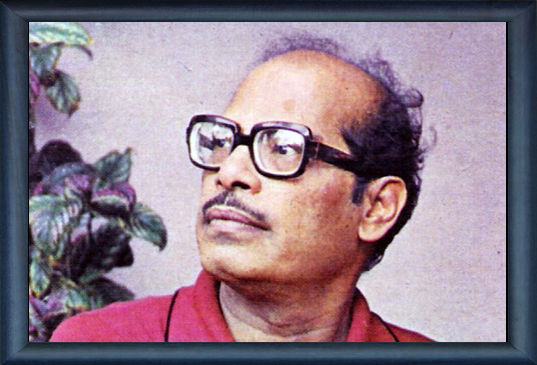Manna Dey is a flawless singer who could sing any type of song. His deep voice usually kept him out of the hero's playback post, but he was never overly concerned of his relatively second-fiddle status. With his semi-classical training, he was a much better interpreter than even
Mohammed Rafi in some cases.
Manna Dey was born Prabodh Chandra Dey, the name 'Manna' conferred on him by his uncle K C Dey. His Father Purnachandra Dey, a chartered accountant, wanted his son, a Bachelor of Arts, to be a Barrister. Prabodh, like countless young students of Calcutta, was under the mesmeric spell of his uncle K C Dey, who was a well-known actor-singer and popular star of New Theatres. The uncle took his nephew as his disciple. Manna Dey was later taught by Ustad Aman Ali Khan, and thus the young singer gained proficiency in the classical music, a foundation on which he built his reputation. This learning equipped him to present any form of Indian music, classical, light and even Western pop with finesse.
Manna Dey grew up to the soft strains of Baul songs, Rabindra-sangeet, and khayal. K C Dey put his nephew through the paces acquainting him with the subtleties of tappa, thumri, bhajan and qawwali. With the disintegration of the
New Theaters in 1940, K C Dey left for Bombay in search of fresh pastures. Manna joined his uncle and started off in Bombay as the assistant to music director H.P. Das. In a strange and hostile environment he found his road to fame strewn with obstacles. The main stumbling block for him was the language barrier which threatened to impede his career. By a systematic study of the Hindi language he mastered the phonetic presentation of words which enabled him to sing with ease and felicity songs not only in Hindi, but also in many other languages of India.
Though Manna Dey had been initiated into the world of music at the tender age of 11 by his uncle and guru K C Dey by recording a Suraiyya and Manna Dey duet for the film Tammanna, years of struggle followed, at times compelling the talented singer to wonder if his choice of career was the right one. He even thought of coming back to Calcutta and take up his law. However, "Upar Gagan Vishal", the marching song from Mashaal, turned into a super-hit and made him stay in the music line. From the very beginning, Manna Dey has been a perfectionist. He is the only artiste who makes notations before recording a song, so that he can sing and record a song just after one rehearsal.
Anil Biswas rightly observed that though Manna Dey could sing everything that
Rafi,
Talat and
Mukesh sang they could not sing what Manna Dey sang.
During his five decades in the film industry, Manna Dey always marshalled all his recourses to render his songs to the highest standards he was capable of achieving to the demands of the moment. However, with the dominance of violence and vulgarity, he found the atmosphere stifling. He thought it better to call it a day. He worked off and on only when the opportunity challenged him. Hit numbers such as 'Poochho Na Kaise Maine Rain Bitayee..', 'Laga Chunari Mein Daag..', 'Aye Meri Zohra Jabeen..', 'Na To Karavaan Ki Talaash Hai..' and Chunri Sambhaal Gori..' and the absolutely mad 'Ek Chatur Naar..', to name a few, spin a tale of Indian life. Though his career graph never soared to dizzy heights, Manna Dey doubtless stands apart because of his deep voice and a wide repertoire: from qawwali to light, romantic duets to classical numbers. ‘All that I have attained in music is because of my uncle's training,’ says Manna Dey with a sense of modesty. The last film he sang for was Nana Patekar’s Prahar.
The singer has a special affection for
R D Burman and
Shankar -Jaikishan. Manna Dey sang a song 'Aao Twist Karen..' for Mehmood's ‘Bhoot Bangla’ which was a lift from ‘Come let us twist’. Before recording the Hindi song,
R D Burman sang the original English song in such great style that Manna Dey, the recordist and the musicians were breathless. With
Shankar –Jaikishan too Manna Dey shared a special bond of affection and friendship. He cherishes his long meetings with them in their music room where he would sing for them for hours. The singer won his Filmfare Award for 'Ae Bhai Zara Dekh Ke Chalo..', the toe-tapping number, from Raj Kapoor's Mera Naam Joker.
On 8 June 2013, Dey was admitted to the ICU in a Bengaluru hospital after a chest infection gave rise to other complications. His health gradually improved and about a month later doctors took him off the ventilator support. Later, he was released from hospital.
He was hospitalized again in the first week of October 2013, and died of a cardiac arrest at 3:45 pm on 24 October at Narayana Hrudayalaya hospital in Bengaluru, aged 94. Musicians, politicians, cricketers and other notable persons issued statements on his death. He was cremated at Bengaluru itself.
With his death an era of Music has ended.

